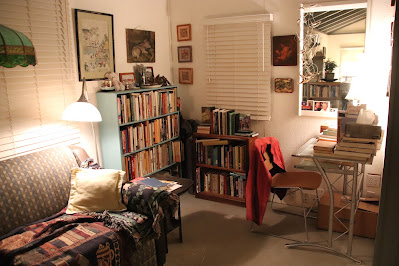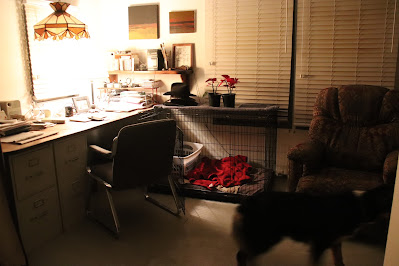Hawthorn trees have been a recurring joy to me since I discovered the first one in my meadow. This year I’m appreciating how much earlier they leaf out than some of the other, statelier trees, how sweetly they hold raindrops, and the way last year’s berries (haws) still attract my dog. She will stand on her hind feet to reach the ones on the branches and root through the grass hunting for those on the ground. Funny girl!
Sunny Juliet herself is a joy and a comfort both. As she becomes a more relaxed and easy companion, though, I find myself addressing her and speaking of her more and more often as Sarah! Will she ever be as mellow as our practically perfect Sarah? Will her name have changed completely in my mind to Sarah by the time she reaches old age?
These days, still Sunny Juliet, when she and I go outdoors for our morning rambles I take along a foraging bag and bring home leaves and flowers for my evening salads. Our walks and finds and my salads are all quiet joys of my country life.
Of course, not everything in life can be a joy or a comfort. Sometimes -- though I realize this may sound odd -- I find a kind of satisfaction in understanding something, some event or trend or belief system or outcome, even when I would wish it completely out of existence if I could. How does such-and-such a system work? Why do people pursue certain policies? In what ways are we manipulated to believe and act against our own interests and that of the earth? And how can human interests ever be separated from the interests of the earth’s health? (That’s a rhetorical question. The separation is impossible.) Like a farmer friend of mine, interested in economics as I am myself, I want to understand, whether or not I can change a thing. I would add, and whether or not there is the slightest hope that human beings will see the light in time to save the earth and the human race.
With that in mind, I sit down to read Naomi Klein’s bestseller, The Shock Doctrine: The Rise of Disaster Capitalism. It is not a comfort book, by any means, nor is there anything joyful in the reading (other than the intellect that put the thoughts together), but it makes so much sense that what I cannot understand is how some people think that every aspect of our lives should be “privatized” and others think that pure and complete socialism is the only answer to organizing society. How can people not see that a mixed economy is the only one supporting a society that works for all? How can the world at large not see that private enterprise has important strengths and should not be thrown out but that there are important aspects of life that cannot be left to a winner-takes-all game?
Meanwhile, they who see clearly their own (short-term?) advantage in disadvantaging others are leading country after country, including the United States and Canada, down the winner-takes-all road, and I don’t expect to live long enough to see this turn around, though maybe I will be proven wrong. Maybe, as an optimistic friend believes, the Eighth Prophecy of the indigenous peoples of the world will turn us away from the edge of the cliff in my lifetime. I would love to be wrong in this way!
 |
| Just because -- for the relief of beauty! |
Satisfaction in inquiry, in understanding, in an exchange of reasonable views with others is all an important part of my life and always has been. I have that with books and with friends, in my work as well as in my leisure. When evening comes, however, I am ready to welcome comfort. By evening Sunny and I have been outdoors more than once, and I have surveyed the progress of spring in field and forest. We’ve had fresh air and exercise, and my salads of foraged greens are satisfying. Maybe Sunny has had the added benefit of a play session with her new friend. All in all, it’s been a good day, in the bookstore and at home, reading and talking to people and getting out into the natural world. But at bedtime, what I want is comfort.
Maybe a new novel or a book of essays or, not infrequently, something I have read before, perhaps many times, will be my cozy bedtime reading. One favorite in the re-reading category is Christopher Morley’s novel, The Haunted Bookshop, sequel to the equally enchanting Parnassus on Wheels. Everyone in the secondhand book business knows these two novels! They were part of what seduced us, eventually, gradually, but ineluctably, into the bookselling life.
In the 1950s and 1960s, my parents were members of the Book-of-the-Month Club, a subscription book service founded in 1926. Originally, a panel of judges chose each month’s selection, and one year Morley’s novels about bookselling were chosen as a monthly selection, the two books together coming to our family home. Despite the ages of the two main characters in Parnassus on Wheels (it is a romance between two middle-aged people, as well as a paean to reading, books, and bookselling), I was captivated by a story that had, for me, all the necessary dream elements: a horse; a “gypsy” wagon; country life; travel; and books! Then came The Haunted Bookshop, with an attractive pair of young people, mystery, suspense, danger, and love in the air! As a girl, I read both books over and over, and I continue to read them over and over today, decades later.
On the subject of re-reading, as on the subject of books in general, I am passionate. Never re-read? That would be like never revisiting a place once loved, spending no more time with a friend of many years! And as every re-reader knows, each reading of the most familiar book is a new experience. New but familiar, yes. As with people we have known and loved for years, there is always room for surprising new realizations.
When I chose The Haunted Bookshop for my bedtime reading the other night, I thought as I held it in my hands how many associations and memories the book contains. To begin with, my volume is from the same book club edition my parents had, so it brings back my earliest readings, and I pause lovingly over the illustrations, which delight me as much if not more than they did years ago. Now in my eighth decade of life, I have still never been to physical, geographical Brooklyn, but thanks to Christopher Morley, Betty Smith, Alfred Kazin, and other writers, Brooklyn has come into my life – here, in this book, in that “between the wars” period that so fascinates me. But also, the chapter headings, the paper – all these little details are important, and as I hold the open book in one hand and rub Sunny Juliet’s chest with the other – she is lying on her back, unmoving, her feet in the air -- the two of us indulge in the most contented hour of our day together.
Charms of this story for me personally? There is the location of the bookstore, its entrance below the level of the sidewalk, exactly like the imaginary tea room the Artist and I planned for the Marlborough Building in Kalamazoo; a coal furnace, so like the furnace in the basement of my parents’ house, where I, like Roger Mifflin (only without a pipe), would gaze into the flames after shoveling coal and see another world; an Elevated railway, like the wonderful, noisy, smelly El I knew in Chicago; and, naturally, a winsome little dog, with a quaint packing case dog bed, decorated like a library.
There is the excitement of the bookseller when called to appraise an important private library; there are windows with transoms; there is corned beef hash (and that is distracting, pulling my mind away from the story and to breakfast at J&S Hamburg in Traverse City); there is that magic name, later adopted by a Sixties a cappella vocal group, Manhattan Transfer. In short (and I am reining myself in, because I could go on and on in this vein), because this book has been part of my life since girlhood, and because I have read it over and over in the ensuing years, my own life’s memories and associations are part and parcel of my re-reading. I notice in tonight’s reading but decide to overlook the sexist attitudes, including the violent impulses that accompany the leading man’s love for the ingenue, because it is all taking place so long ago, my father only a year and a half old, my mother not yet born – and anyway, it is a story, and these are fictional characters. And it means more to me now, as a story set in a bookstore, than it ever could have before my own bookstore had been around for over 30 years.
Following the final page of his story, Christopher Morley adds a page about bookstores, first quoting from another of his own books, John Mistletoe:
The bookstore is one of humanity’s great engines, and one that we use very imperfectly. It is a queer fact that most of us still have the primitive habit of visiting bookshops chiefly to ask for some definite title. Aren’t we ever going to leave anything to destiny, or to good luck, or to the happy suggestion of some wise bookseller?
Without claiming wisdom for myself, I will urge my blog readers – because surely you are all bookstore visitors, too! – to visit bookstores as you go to a potluck dinner, ready to discover and be delighted by something you didn’t know you wanted until it came into your hands. Then your excitement will be a bookseller’s joy.




























